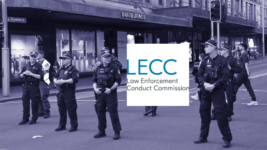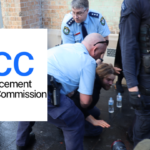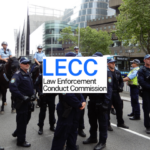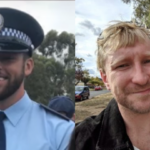Calls for Action Against NSW Police Officers Who Coerced a First Nations Man in Custody

NSW police executed an arrest warrant on 28 May 2020, at the residence of a 29-year-old First Nations man, which subsequently led to arrest, his being taken into custody and then charging in regard to a number of larceny and break and enter offences down at the local copshop.
The Aboriginal man, who is considered a “vulnerable person” in law, spoke to two solicitors, who advised him not to take part in an interview. The person in police custody accepted this advice but he still went on to participate in two such interviews. And despite his asking to pause them, so that he could speak to a legal professional, this was ignored, and he then went on to make false admissions.
But when the charges came before NSW District Court Judge Siobhan Herbert, her Honour ruled during a pretrial hearing, that the evidence before her was inadmissible because of the manner in which the two officers, who also had the unidentified man take part in a forensic procedure, had been applying “undue pressure” upon the suspect.
The NSW Director of Public Prosecutions (DPP) then made a complaint regarding the matter to the Law Enforcement Conduct Commission (the LECC), raising issues around potential “improperly obtained admissions”, the custody manager’s failure in his duties and whether “procedures are in place within the NSW Police Force in order to guard against “failed prosecutions”.
The LECC released its report on Operation Pamir, it’s investigation into the way NSW police officers dealt with a vulnerable First Nations man in custody, last Friday, and it sets out that the inquiry resulted in a finding that three police officers had partaken in serious misconduct and the watchdog has recommended that NSW police commissioner Karen Webb take action against those involved.
The law is malleable down at the station
Officers raided the 29-year-old First Nations man’s home in May 2020, in response to a series of break and enters resulting in the theft of motor vehicles taking place across greater Sydney, as his partner’s car was implicated in one such incident. And certain items that CCTV documented having been involved in a Strathfield break and enter and motor vehicle theft were all located in his home.
Down at the station, the custody manager, an acting sergeant, informed the man of his rights under the Law Enforcement (Powers and Responsibilities) Act 2002 (NSW) and the suspect also spoke to an Aboriginal Legal Service solicitor, who advised him that he didn’t have to participate in the interview or the forensic procedure, and he opted to forgo the interview but not the procedure.
Despite his decision, the two investigating officers took him for an interview, in which he admitted to partaking in the crimes. The man then spoke to another lawyer, who advised him not to be interviewed, yet the same thing happened again, with the man in custody then admitting to crimes that it was impossible for him to have participated in, and he was charged with 22 criminal offences.
The LECC report further explains that NSW police standard operating procedures require custody managers to ensure that the rights of persons in custody are maintained, as in accordance with part 9 of the LEPRA, and further the SOPs require that duty managers must determine whether people in custody are vulnerable persons, and if so, they must actively assist them in exercising their rights.
Regulation 29 of the Law Enforcement (Powers and Responsibilities) Regulations 2016 (NSW) maintains that the custody manager must “as far as practicable” assist a vulnerable person being held in custody to exercise their rights as set out under section 9 of the LEPRA, including with the “right to make a telephone call to a legal practitioner, support person or other person”.
But the LECC found that the acting sergeant in charge at the time that the Aboriginal man was taken to the station had done “less than the bare minimum” and “did not seek to go above that”, which had involved him being aware that a vulnerable person in custody had been advised not to participate in a police interview but then going on to take part in one regardless.
The right to silence in NSW
The right to silence continues to be a fundamental principle in NSW common law, however it has been under attack over the last decade, ever since the O’Farrell Coalition government passed a new law on 1 September 2013, which inserted section 89A into the Evidence Act 1995 (NSW), so that if a lawyer is present during a police interview, officers can then give a special caution.
The exercising of the special caution then results in the court being able to make adverse inferences in regard to a suspect if they exercise their right to silence in front of their legal practitioner, when it could have been expected that the defendant should “reasonably have been expected” to mention a specific fact “in the circumstances existing at the time”.
There are also additional circumstances in which the right to silence has been diluted in this state, which include during Independent Commission of Corruption (ICAC) hearings, as well as in relation to some terrorism offences.
Ensuring action is progressed
The key recommendation made by the LECC is that the NSW police commissioner take “reviewable action” against the two arresting officers and the duty manager at the police station at the time the man was questionably hauled in.
The watchdog advises such action should be taken under the provisions of section 173 of the Police Act 1990 (NSW), which facilitates demotions in rank, grade or seniority, as well as deferrals of salary or any other actions deemed adequate.
The Law Enforcement Conduct Commission further recommended that state law enforcement ensures that all its officers are up to scratch on the right to silence of a person in custody and the implications of that right not being afforded to a suspect.
“The training should focus on identifying when a person in custody exercises that right and the need to immediately cease any interview or questioning once that right is exercised,” the LECC insists.
The body of inquiry further posits the need for investigating officers and custody managers to be made aware of the distinction between “legal advice provided by a legal practitioner and instructions given by a person in custody to their legal practitioner”. And it further stresses the importance of recording those instructions and “respecting” them.
“Custody managers should be trained to be more conscious of situations… where a person in custody has given instructions not to participate in an interview, and yet investigating officers are attempting to interview the person in custody whether formally or informally,” the report further makes clear.
In conclusion, the LECC set out that the incident that is the focus of the new report had echoes of the findings of another LECC investigation, that of Operation Mantus in December last year, which uncovered NSW police officers having interviewed a 14-year-old Aboriginal boy, who’d been roughed up prior to being taken into custody, despite his attempt to exercise his right to silence.
The report authors then note that commissioner Webb must notify the LECC as to the “nature of the actions which she has taken” against the three officers found to have partaken in serious misconduct, as a result of the inquiry, as the watchdog “will closely monitor the NSW Police Force response to the recommendations” that have been made.







